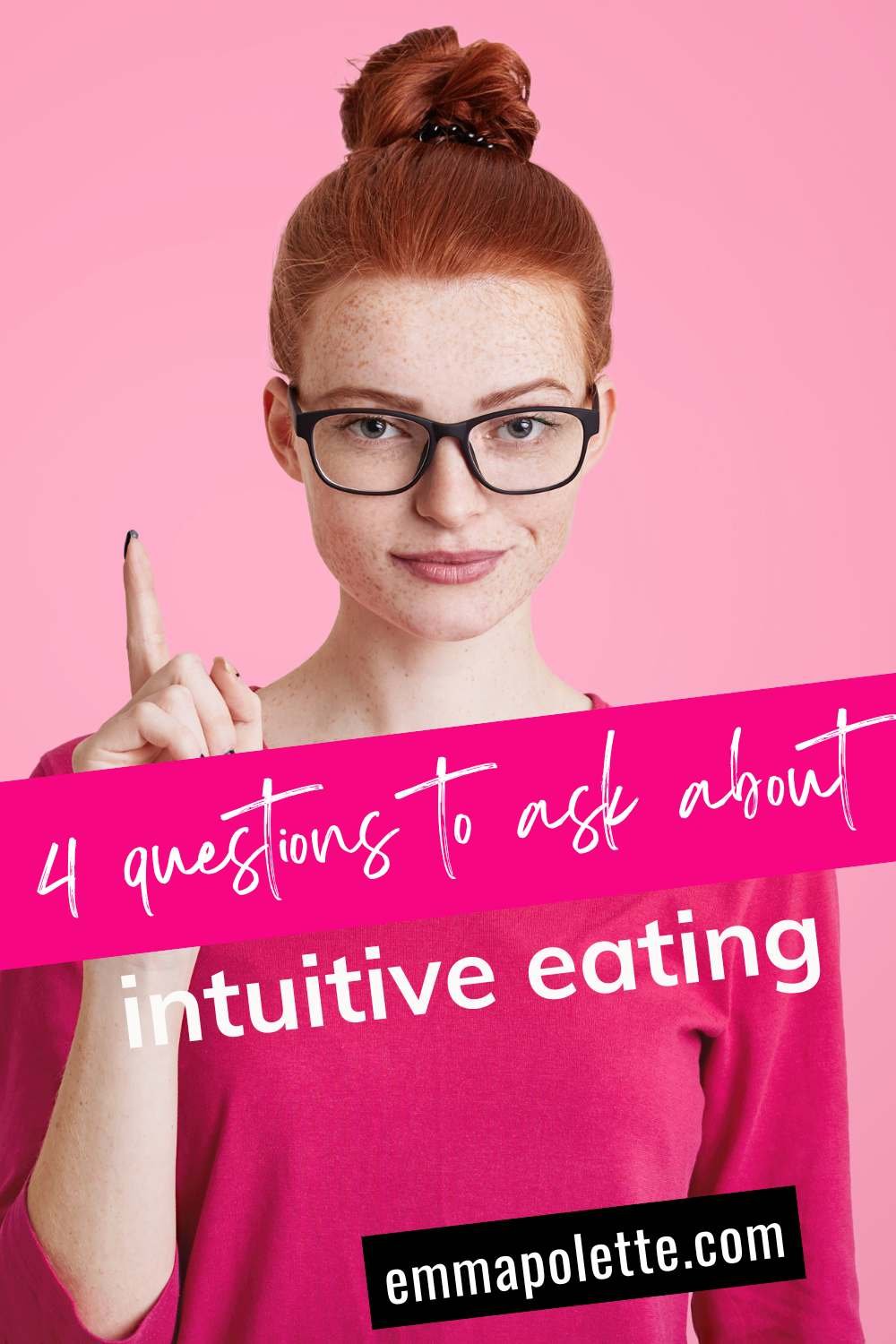4 questions to ask yourself to determine if you already practicing intuitive eating
You’ve watched a toddler eat, right? One minute they are hungry, stuffing whatever they can into their mouths. The next minute there is no chance you can get them to eat a thing. Last week all they wanted was broccoli, and this week all they want is cheese. Broccoli? No way! And, have you ever seen a toddler feel guilty for what they’ve eaten? Probably not.
All of these things are signs of intuitive eating. We are born intuitive eaters. We know how much food is enough, and what we like, and we don’t feel guilty about it. Unfortunately for most of us, rules get imposed. “Don’t eat too much sugar.” “Don’t eat past 7 pm.” “Definitely don’t get fat.” These rules impact our freedom around food and then intuitive eating is lost. Instead, for many of us, food becomes a source of stress, extreme planning, and guilt which robs us of the peace and joy we used to feel around food.
In this article, I would like to share some questions you can ask yourself about intuitive eating to see if:
It’s something you want to incorporate into your healthy behaviours
How far you’ve strayed from intuitive eating
What is intuitive eating?
In a recent post, I outlined intuitive eating. Read more about that here. For brevity’s sake - intuitive eating is a non-diet approach to gentle nutrition that recognises health is possible at every size, and encourages practitioners to make peace with food. In the intuitive eating world, when it comes to food, nothing is off-limits. Instead, we learn to trust our bodies and know that in the long run, we eat enough nutrients to keep us healthy and alive.
What are the benefits of intuitive eating?
Quite simply, the evidence (over 100 peer-reviewed articles), shows that intuitive eating is a great way to stabilise weight and improve other health markers like blood pressure and cholesterol levels. Studies also show that intuitive eaters tend to eat a wider range of nutrients than those who diet. Intuitive Eating also helps to improve body image and promote better mental health (Source: Insider.com).
Personally, I have found that intuitive eating has been a huge help to my mental health. When I was dieting my whole life revolved around how much to eat, what to eat, when to eat, and then feeling guilty even if I’d been “good” because I should have been better!
Without exception, when I am working with private clients to help them overcome body shame and a disordered relationship with food, I teach them the tenants of intuitive eating because it is a documented, tested plan that promotes good health without guilt, shame, and mental distraction.
So, maybe you are already practicing intuitive eating?
It’s hard to escape diet culture because it is, quite simply, everywhere. However, some lucky people wouldn’t have been subjected to too many food rules while growing up and wouldn’t have been objectified by friends, family or complete strangers. But, I do believe those people are rare! Most people need some help to release their combative relationship with food and the following questions will help you see where you might need support.
Please note, the questions below are adapted from The Intuitive Eating Workbook by Evelyn Tribole and Elyse Resch. To get a better understanding of whether you are practising intuitive eating already I recommend reading the book Intuitive Eating or considering joining my upcoming intuitive eating course.
Now for the questions… answer yes or no to the following:
Question 1 - I get mad at myself for eating something unhealthy
Question 2 - I use food to help me soothe my negative emotions
Question 3 - I trust my body to tell me what & when to eat
Question 4 - Most of the time I desire to eat nutritious foods
If you answered no to questions 1 and 2 and yes to questions 3 and 4 then you are probably already an intuitive eater. If you didn’t, that’s okay! Most of us aren’t anymore. But these questions will give you some answers to where you might need help with your relationship with food.
Question 1 relates to having unconditional permission to eat whatever you want. This is very hard for most people because we believe if we just ate whatever we wanted then all hell would break loose and we’d eat junk food all the time. Fortunately, that isn’t true. Yes, of course when we stop having food rules after years of being good dieters, we are probably going to eat more junk than we used to. But that won’t last forever. When left to its own devices, your body will want nutritious food, and learning to trust that is one of the biggest gifts you can give yourself.
Question 2 relates to eating for physical reasons rather than emotional ones. A study by Peneau et al from 2013 shows that people who diet have an increased risk of using food to deal with emotions. We all do it from time to time and that’s okay because food can be very soothing, however, when we don’t have other ways to cope with difficult emotions, eating for comfort can add to negative feelings and health problems.
Question 3 relates to eating for hunger and stopping for fullness. When we’ve dieted for a long time, we lose touch with our interoceptive awareness. This means we can’t feel our internal bodily cues like being hungry or feeling full. That’s how we go for ages without eating enough (not noticing hunger) and then overeat because we need the food but can’t/don’t feel full until it's too late. Then we feel sick and guilty and the cycle starts all over again.
Question 4 relates to body-food choice congruence. This means we eat what our bodies need. We eat enough nutrients, an amount that suits our unique body and feel satisfied with our choices. There is a big amount of trust going on here which we lose when we diet.
How have the questions made you feel? Do you think you could make some changes to your eating habits so that you make peace with food and reduce the amount of stress that you feel? Do you want to learn to trust your body rather than being at war with it? We will cover this and more in my upcoming Intuitive Eating course. Drop your details in the boxes below so you can be the first to hear about it when it becomes available.


